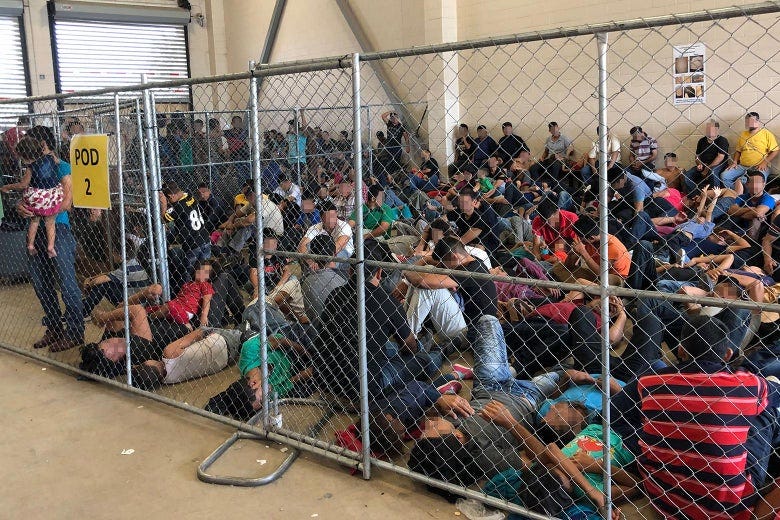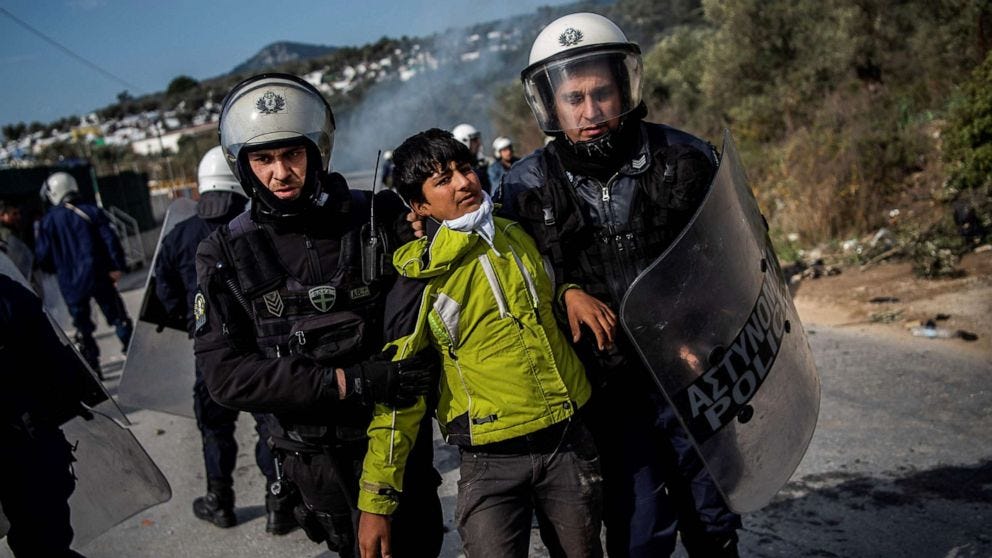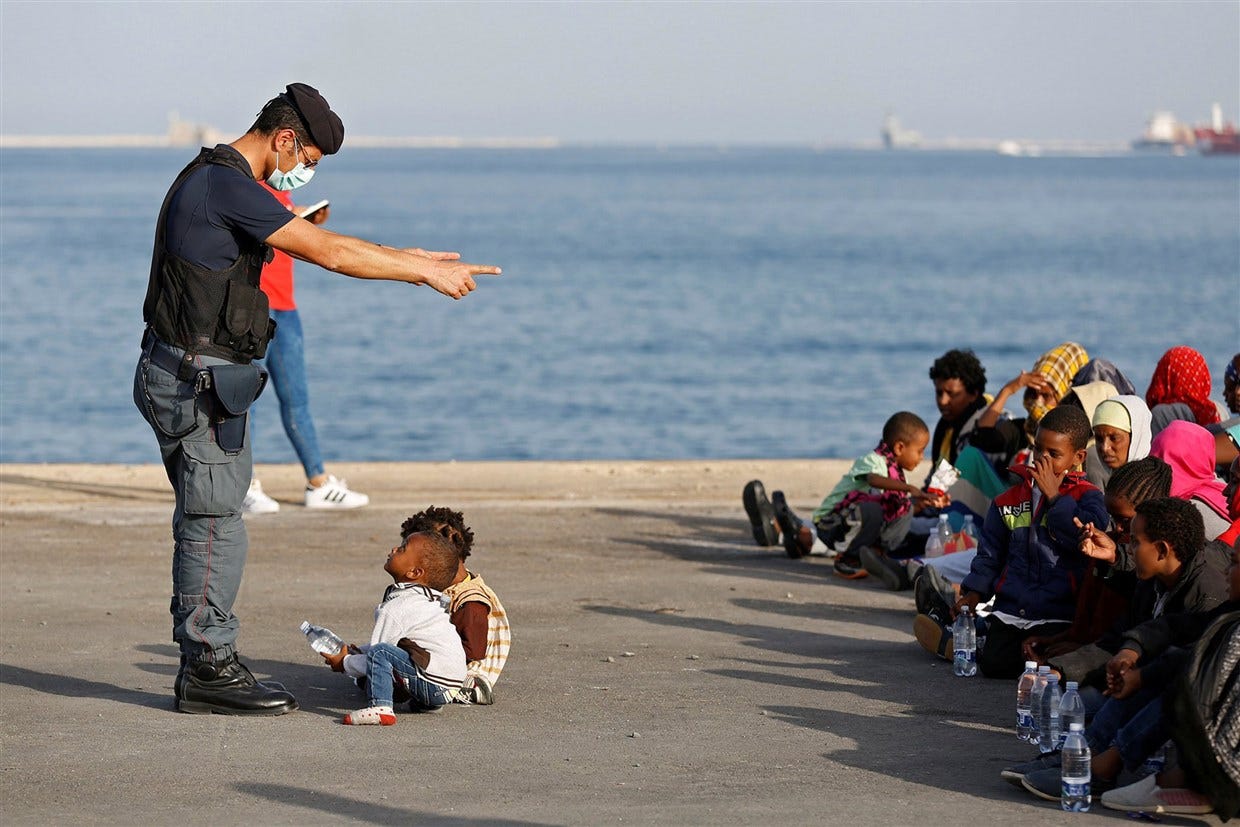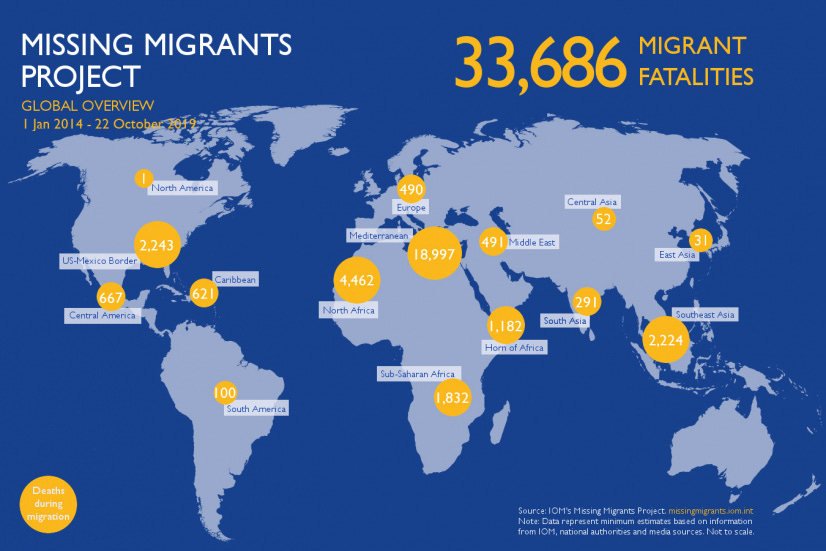Interview: Harsha Walia on the New Pillars of Border Imperialism
If you’ve ever encountered the words “border imperialism”, it’s because of Harsha Walia, who coined the framework. Her critical analyses of modern border enforcement has transformed scholarship on the subject. During my guest editorship of High Snobiety I had the distinct pleasure of speaking with her.
Our conversation covered the links between abolition and the no borders movement, the way flow of capital determines flow of people, and how Covid exposed the farce of passport control.
The latest book from the community organizer and award winning author of Border Imperialism is Border and Rule: Global Migration, Capitalism, and the Rise of Racist Nationalism - available now (and on sale through March as part of Haymarket’s Books for Women’s History Month.)
You can read a condensed version of the interview at High Snobiety, along with features with many other remarkable individuals and an introduction by me. Below is the full transcript of our exchange.
Let’s start with the origin point for border violence, the guise of security. In your new book you critique ‘securitization’ as the process by which the border becomes a testing site for surveillance technologies, automated decision-making, predictive data analytics, facial recognition software and biometric systems. Could you describe that process further?
Yeah, I would say that border violence really occurs in many sites. And that's part of the argument that I make in Border and Rule, which is that border is not a single line on a map where border violence occurs. The border is elastic. But we also have outsourced borders and internalized borders in many forms. Those also inform part of the analysis of border violence. We see border securitization happening inland too. For example, in the criminal legal system there's a pipeline for expulsion and deportation. If someone gets picked up by the cops, or even sometimes if you're going to the hospital or your kids are in school, and your immigration status is found out, then that becomes a site of border violence as well. And when it comes to the surveillance industry it's omnipresent. It's at the border with massive security companies making billions of dollars off of contracts to test surveillance mechanisms on migrants and refugees. At the US-Mexico border there's just billions of dollars sunk into drone surveillance, high-tech software surveillance, but also that kind of surveillance exists inland too. In parts of Europe, for example, refugee housing uses facial recognition technology. In Canada, the Immigration and Refugee Board is starting to pilot algorithmic AI decision-making to decide if someone is a refugee or not, and whether they'll get to stay or be deported. We see this kind of testing at the side of the border, but really just diffused against migrants and refugees in many contexts, and absolutely, migrants and refugees have become the testing ground for a lot of this kind of surveillance in automated decision-making, in this concept of “smart borders”in Europe, in facial recognition technology and drone surveillance. This massive industry is a dystopic testing ground that is used against not only against migrants and refugees but they certainly are one of the many populations against whom it’s weaponized.

It sounds like the border goes far beyond map lines, because it ends up being inscribed onto people themselves as they move through the world.
Yeah, absolutely, and that's one of the things that I argue in Border and Rule that we often ignore when we think of the border. Outsourcing a border, I think is becoming one of the primary methods of imperialism. And by that, I mean, we have countries like Canada, countries like the United States, countries like Australia, we have the EU, all of whom are increasingly outsourcing their border enforcement to third countries. And they're increasingly making aid and trade and development agreements contingent on migration prevention clauses. In Australia, for example, whenever it makes trade and aid agreements with countries like Papua New Guinea and Nauru - with whom it has a very nascent history of formal colonialism - those countries are forced to accept outsourced detention centers. Australia now out-sources its [immigrant] detention center to countries like Papua New Guinea and increasingly to Indonesia. In Europe, the EU of course has fortified its borders, and the Mediterranean is the deadliest border in the world. Paying Libya, and that’s the most known example, but also paying countries throughout the Sahel region - Mauritania, Niger, Tunisia. The frontier of border militarization is the Sahel region, and all the aid money is going into boots on the ground border enforcement and training. And that's of course also true of the United States. It was only brought to light when Trump implemented the remain in Mexico protocol, where Mexico is now implementing US policy. That was perfected by the Democrats not by Trump. Under President Obama there were a number of initiatives where border enforcement was outsourced to these third countries. That's the way in which borders and border enforcement travels. I argue that a pillar of modern day and contemporary imperialism is the outsourcing of borders. So then US border enforcement isn't just about looking at what happens in the US at the US-Mexican border. It means we also have to look at the border enforcement increasingly happening in countries like Mexico.

I like that you use the word displaced people. That's the word I feel most comfortable using because it names the active process - something that happened to or was done to someone rather than defining them through their status. Should we be wary of how words immigrant, migrant and refugee are used, particularly when they're used by the state? Because even the term ‘refugee’ is used by the state to legitimize someone’s transit which means we’re still predicating the validity of movement on state designations and what violence the state is willing to recognize, which always absolves the violence the state enacts.
Absolutely. Of course. When the state uses and fluctuates between categories like immigrant, migrant and refugee, there's often a different intention and violence to that, which is to create categories of who's deserving, who's undeserving, and creating a hierarchy of state selection of immigrants that are largely class privileged with formal educational background. Whereas one kind of movement for economic reasons is praised and celebrated and welcomed, there is another kind of movement for economic reasons and it's positioned as bogus in relationship to refugees. There's a long political history to these kinds of differentiation that really go back to the Cold War era. In the United States, refugees who were seen as seeing Castro's Cuba, for example, or Vietnamese rescued at sea fleeing communist regime in Vietnam were welcomed. And their depictions were very much where the US was the savior. In contrast, migrants and refugees who were fleeing US-backed dictatorships, particularly in Haiti, were all detained and called bogus refugees and migrants. Those discrepancies are important. That said, I tend to use migrants and refugees together because a lot of people use those terms to identify themselves. So I think it does depend on who's using the language and for what purpose.

Speaking to the question of language and the ideology it can contain, I wanted to ask you about the development of citizenship as a luxury commodity. I've seen it called investment migration - which is the official term for the ability to buy a passport. And when I first encountered it, I felt the term “investment migration” is to “refugees” what “expat” is to “immigrants” - terms generated to quietly make race and class distinctions. I wanted your thoughts on the phenomenon particularly during the pandemic, which, according to agencies that serve these people, doubled the rate of inquiries into purchasing passports.
Yeah, it's such a good question, right, because I feel “investment programs” for citizenship really make clear what citizenship is. Which is that it's really an arbitrary privilege. People tend to really grasp onto the racial underpinnings of citizenship, this idea of us and them and the scapegoating of migrants as foreigners is so entrenched across the world. And yet we have these kinds of programs that make it clear that citizenship is completely arbitrary, it's based on accident of birth and capital. And that's why I think it's not actually a contradiction. A lot of times people point out the contradiction that capital moves so freely across borders and people don't... And I'm like, well, that's not actually true. Because there is a lot of movement across borders. Investment citizenship is one example, and tourists. If you have an American passport you have mobility across the planet, generally speaking, visa-free access to most countries in the world. So it's not really true that people can't move. It's that people who represent capital absolutely can move in various forms, whether that's investor-based citizenship whether that's high skilled visa programs, whether that’s tourism, whatever it is.
What the real contradiction is, and it's not actually a contradiction, is that labor is immobilized by borders. And that's not a contradiction because of course, capital needs immobilized labor. That's what capital needs is cheapened - not cheaper but deliberately cheapened labor - which it creates by segmenting people. That's what the border does. Whether you're insourcing migrant labor or your outsourcing labor to parts of the global south, sweatshop labor etc. For me, these investment programs actually very clearly represent citizenship.
I love that you said that because I think many of the people who read this interview will be people who have secure status within the nation they're in. And I think what you've just said really calls on all of us to recognize and situate ourselves within this paradigm...We can then think of the ways in which we are valuable to the state or are recognized as capital. And what that implies about our proximity and utility to the state and how we can then extend more solidarity to those further away from that position and be more deliberate about where our awareness and allegiance lies. I wanted to ask you more about this flow of labor and capital across borders, because immigration patterns often reveal who makes up the domestic labor class in certain countries. You have South Asians in the Arab Gulf, Malaysians in East Asia, South Americans in the US. Does that make it fair to describe immigration as an extractive economy, does that also lay bare the same function that you just described investment citizenship doing?
I think so, I'd have to think on that Ayesha your question is so good. We tend to think of an extractive economy in the context of resource extraction. But not in terms of immigration or labor, so it's a good question. I think absolutely immigration is a pillar of racial capitalism. And if we see the extractive economy as central to contemporary racial capitalism then absolutely, yes. I think labor migration is, in the same way that outsourcing a border is, one of the primary pillars of imperialism today. With increasing flows of capital, there is a need for labor to be cheapened across borders. Then in that way absolutely it is extractive because contemporary immigration really is just indentureship 2.0, right? People are tied to an employer.
In Border and Rule I argue that they really are carceral regimes. Because it's not only that people are indentured to an employer. It's not just the conditions of labor. The totality of life is constrained. In many of these kinds of labor regimes - which are legal state-sanctioned regimes - it's not about one bad employer, but really the whole program is a state-sanctioned indentureship. Which allows for employers to confiscate identity documents, allows employers to literally cage people in their homes. A report in Lebanon with domestic workers who are primarily Filipina, Indonesian, and Ethiopian. They all talked about their employers home as a prison. That's what the report was titled. It's not an overstatement or a false analogy to speak of these labor migration programs as carceral. And of course, there's the horrific nature of extraction, where your workers are paid less than minimum wage, working often 16 hours a day. Wage theft is endemic to these programs and so is the disposability of it. When the work is done they're literally deported. And so, absolutely, I think it is extractive. I think what people really need to understand about it is that this is becoming the global template for migration. Because as people are more and more afraid about immigration kind of disrupting the racial, social order of states, they're looking at this kind of disposable, cheapened labor force. And labor migration is like the flip side of outsourced labor. So in the same way that countries will outsource manufacturing, all the kinds of labor that they can’t outsource gets insourced through this kind of labor migration. Like domestic work, construction work, etcetera, agricultural work.
The carceral nature of it, does that then link movements against border violence to the abolitionist movement?
Yeah, absolutely. I think the calls to abolish the border are also calls that are abolitionist in nature. Because those movements don’t focus on good immigrants and bad immigrants, the same way that abolition calls us to turn away from focusing on whether someone is innocent or not. I think we see criminality and illegality are both political constructions. And that requires us to dismantle state violence. And so for me, I think for sure, the kind of no-border politics is an abolitionist vision because it calls on us to dismantle borders as a site of violence that reproduces oppression and violence and also calls on us to dismantle the conditions that allow for borders to exist.

I think both the prison abolition movement and movement against borders both require people to fundamentally re-evaluate how we've been taught to view people and how to feel about them. Society is organized to view people through their value to capital and through race, how have nationalist movements exacerbated the already racist and carceral impulses of border control?
One of the main shared impulses for people to join the right is anti-migrant xenophobia. There are so many progressive people who believe in the border without realizing just the immense amount of violence it upholds. It really is just such a feature of global apartheid to say that someone has the right live somewhere based on the state telling you so is a form of global apartheid. It's one of the deepest and enduring forms of racial and social segregation in our contemporary world. So I think absolutely an abolitionist vision of no border is a vision of freedom. Where people are free to move, but also it means fighting to make sure that people aren't forced to move. That people have the right to stay. That we’re not continuously bombing countries and exploiting their lives and resources. ,.
Right because war is a massive cause of displacement. Are there other forces that you feel are important to identify right now that are behind modern displacement?
There are over 600 free trade agreements on the planet. And free trade agreements are basically a device of privatization and extraction that decimate local economies and decimate non-capitalist economies. Communal land holdings are basically disallowed via free trade agreements. Climate change is increasingly becoming one of the primary propellers of displacement around the world. Particularly in coastal communities. And the statistics are horrifying, the number of island countries that are on the verge of submersion. The primary drivers of forced displacement are the triad of climate change, capitalism and conquest: ecological devastation largely driven by Western induced climate change; ongoing wars and occupation, including the arms trade; and the ravages of global capital that is forcing more and more lands to open up to capital extraction, which leads to indebted farmers and indigenous people being forced off their land. But I think what has changed is the power of social movement to really force a more radical understanding of migrant justice. We're starting to see the idea of “no human being is illegal” or “open the borders”, or “no borders” really move from the fringe to the center. In tandem with abolitionist politics and in conversation with abolitionist politics. Especially with the leadership of Black migrant refugee organizations like Black Alliance for Just Immigration in the US, for example, moving toward refusing immigration reforms that are compromises that throw some people under the bus. What else has also shifted is more increasingly connecting global forces to immigration. Immigration is not just a local phenomenon, it’s deeply connected to global forces, of capital and imperialism and why people move.
Where do you identify the most urgent points of intervention that need to be made in this process?
I'd say the most urgent intervention really is a call for no borders and to question the legitimacy of borders. But again, not just the border on the map, but borders as a regime that is deeply embedded and inseparable from imperialism and capitalism and racial stratification on this planet. I think it's really important that we don't see migrant justice organizing as siloed from other movements. Migrants are the human face of all of these forces and ills in the world. So I think we need to think about it more extensively and with an international lens.
I think what you're saying could strike people as very abstract, but it actually can be applied on a quite granular level. Because what you're saying implies that the best places to make the intervention is in our daily interactions and how we see people and how we treat them and what kind of treatment we allow or view as an acceptable cost of a certain social order.
There is this tendency towards thinking like, “I don't have a problem with racialized people, I just had a problem with illegals” right? But we see statistically that, for example, in the United States, the largest nationality of people who are technically “illegal” - who have overstayed their visas, are actually Canadians. And we don’t have stories of white Canadians in detention. And in Canada, in the province I’m in, one of the largest populations of people who have overstayed or are working illegally are Australians in the ski resort industry. Who we think of as the outsider has very little to do with your actual legal status. It has to do with how you’re perceived. Like you said, how we view people on the street. And the kinds of daily, seemingly mundane, “where are you from? No where you really from.” Who gets positioned as the stranger who gets recognized as different or an outsider is deeply racialized, and in fact, has nothing to do with legality even though we're told it's about law and order. Which is why I think it's so important to interrogate.
There’s no crisis that the state won’t take advantage of. How has Covid empowered the state to increase border control and the resulting violence?
Covid, in the crisis of the pandemic has become really the perfect excuse to hasten the vision of securitization of borders. Throughout the pandemic, almost 60 countries have completely shut their borders to people speaking safety. But also... and there's just so many examples, because there are so many countries where refugees have been not allowed in... In Malta, for example, the government let a boat that was sending distress calls because the boat was filling up with the water, they said that they couldn't let them in because of Covid and then dozens of people died. And in the Mediterranean we’re continuously hearing stories of EU countries that are refusing refuge under the guise of the pandemic. But of course, what the pandemic has also done is again, highlight the seeming contradiction, which is that the border is closed to asylum seekers, to refugees, to people seeking safety, but the border remains open to labor migration.
In the United States, for example, agricultural workers who are coming in on H2A visas, those processes are being expedited to ensure that the food supply chain is not affected during the pandemic. So even though almost all other immigration and refugee processing has been shut down H2A visas are just being churned out. So the border remains open to labor migration. And the flip side is the borders also remain open to deportations.
Every country, though they're claiming all our borders closed, has no problem continuing to deport people out of their countries. And in the early days of the pandemic, in April, around this time last year, the Guatemalan government estimated that approximately 20% of all Coronavirus cases in Guatemala actually came from people deported from the United States. We see the pandemic really exacerbating bordering regimes (which is to securitize borders and close the borders) but have it remain open to capitalist interest and to cheapened labor supply, and also open to deportation. The border is not closed governments trying to expel people.
My concept super-hero, the Anti Border Android, is here.



